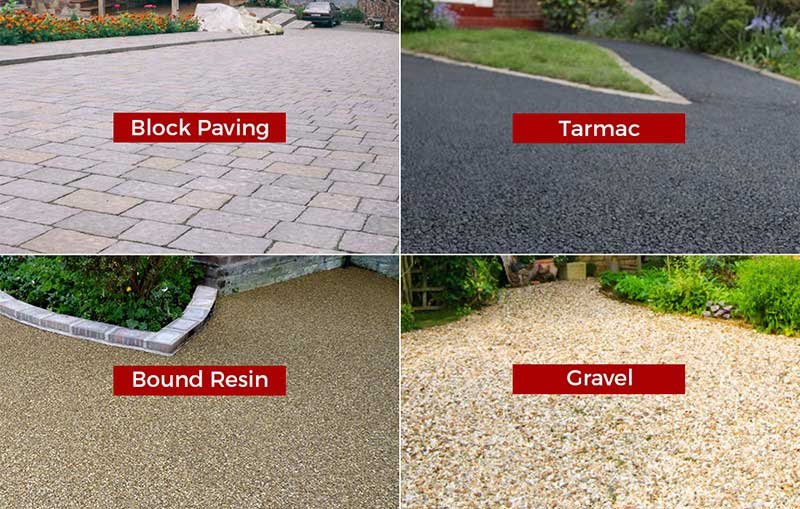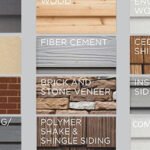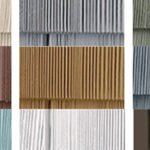Alternatives to Asphalt: Top Choices for Driveways and Roads

When it comes to constructing driveways and roads, asphalt has long been a popular choice due to its durability, cost-effectiveness, and ease of installation. However, there are many alternatives to asphalt that offer a range of benefits, from aesthetic appeal to environmental sustainability. In this article, we will explore some of the top choices for driveways and roads that serve as viable alternatives to asphalt.
- Brick: A Classic Choice
- Gravel: Affordable and Versatile
- Permeable Pavers: Eco-Friendly Option
- Crushed Stone #411: A Blend of Stones for Stability
- Quarry Process: Durable and Sturdy
- Pea Gravel: Small but Mighty
- Jersey Shore Gravel: Aesthetically Pleasing
- Marble Chips: For a Touch of Luxury
- Blackstar or Blacktrap Rock: Dark and Durable
- TRUEGRID Permeable Pavers: High-Tech Solution
- Recycled Item #4: Environmentally Conscious Choice
- Quarry Item #4: A Reliable Standard
- Crushed Limestone: Traditional and Timeless
- Crushed Bluestone Item #4: A Unique Option
- #57 Stone: Versatile and Functional
- Sand: Simple and Natural
- Dirt: The Original Road Material
- Golf Ball-Sized Stones: For a Distinctive Look
Brick: A Classic Choice
Brick is one of the most classic alternatives to asphalt for driveways and roads. With its rich, warm color and timeless appeal, brick can add a touch of elegance to any property. In addition to its aesthetic appeal, brick is also highly durable and can withstand heavy traffic and harsh weather conditions. It is also easy to repair, as individual bricks can be replaced if they become damaged. However, brick can be more expensive than asphalt and requires a professional for installation.
Gravel: Affordable and Versatile
Gravel is another popular alternative to asphalt, particularly for driveways. It is one of the most affordable options and is available in a variety of colors and sizes, making it a versatile choice for any property. Gravel is also easy to install and maintain, and it provides excellent drainage, preventing water from pooling on the surface. However, gravel can shift over time, requiring regular maintenance to keep it in place, and it may not be suitable for areas with heavy traffic.
Permeable Pavers: Eco-Friendly Option
For those seeking an eco-friendly alternative to asphalt, permeable pavers are an excellent choice. These pavers are designed to allow water to pass through them, reducing runoff and helping to replenish groundwater supplies. They are also highly durable and can withstand heavy traffic and harsh weather conditions. However, permeable pavers can be more expensive than asphalt and require professional installation.
Crushed Stone #411: A Blend of Stones for Stability
Crushed Stone #411, a blend of #57 stone and stone dust, is a great choice for driveways and roads. The stone dust fills in the gaps between the larger stones, creating a stable surface that can withstand heavy traffic. This blend of stones also provides excellent drainage, making it a good choice for areas that receive a lot of rain. However, like other stone-based alternatives to asphalt, Crushed Stone #411 can shift over time and may require regular maintenance to keep it in place.
Quarry Process: Durable and Sturdy
Quarry process, also known as QP or Dense Grade Aggregate (DGA), is a combination of small crushed stone and stone dust. This mixture creates a semi-permanent surface that is extremely durable and sturdy, making it a great choice for driveways and roads that see a lot of traffic. However, quarry process can be more expensive than asphalt and requires professional installation.
Pea Gravel: Small but Mighty
Pea gravel, named for its small, pea-sized stones, is another popular alternative to asphalt. Its small size makes it easy to spread and compact, creating a smooth, even surface. Pea gravel is also available in a variety of colors, allowing you to customize the look of your driveway or road. However, like other gravel-based alternatives to asphalt, pea gravel can shift over time and may require regular maintenance to keep it in place.
Jersey Shore Gravel: Aesthetically Pleasing
Jersey Shore gravel, with its distinctive yellow color, is a visually appealing alternative to asphalt. This type of gravel is often used for landscaping purposes, but it can also be used for driveways and roads. It provides excellent drainage and is easy to install and maintain. However, like other gravel-based alternatives to asphalt, Jersey Shore gravel can shift over time and may require regular maintenance to keep it in place.
Marble Chips: For a Touch of Luxury
For those seeking a touch of luxury, marble chips are a unique alternative to asphalt. These chips, made from crushed marble, add a touch of elegance to any driveway or road. They are also highly durable and can withstand heavy traffic and harsh weather conditions. However, marble chips can be more expensive than asphalt and require professional installation.
Blackstar or Blacktrap Rock: Dark and Durable
Blackstar or Blacktrap rock is a dark, durable alternative to asphalt. This type of rock is extremely hard and resistant to weathering, making it a great choice for driveways and roads that see a lot of traffic. However, like other rock-based alternatives to asphalt, Blackstar or Blacktrap rock can be more expensive than asphalt and requires professional installation.
TRUEGRID Permeable Pavers: High-Tech Solution
TRUEGRID permeable pavers are a high-tech alternative to asphalt. These pavers are made from 100% recycled plastic and are designed to allow water to pass through them, reducing runoff and helping to replenish groundwater supplies. They are also highly durable and can withstand heavy traffic and harsh weather conditions. However, TRUEGRID permeable pavers can be more expensive than asphalt and require professional installation.
Recycled Item #4: Environmentally Conscious Choice
For those seeking an environmentally conscious alternative to asphalt, recycled item #4 is a great choice. This material is made from recycled concrete, brick, and asphalt, making it a sustainable choice for driveways and roads. It is also highly durable and can withstand heavy traffic and harsh weather conditions. However, recycled item #4 can be more expensive than asphalt and requires professional installation.
Quarry Item #4: A Reliable Standard
Quarry item #4, a mixture of small crushed stone and stone dust, is a reliable standard for driveways and roads. This mixture creates a semi-permanent surface that is extremely durable and sturdy, making it a great choice for areas that see a lot of traffic. However, quarry item #4 can be more expensive than asphalt and requires professional installation.
Crushed Limestone: Traditional and Timeless
Crushed limestone is a traditional and timeless alternative to asphalt. This material has been used for centuries for roads and driveways, and it continues to be a popular choice today. Crushed limestone is highly durable and can withstand heavy traffic and harsh weather conditions. However, it can be more expensive than asphalt and requires professional installation.
Crushed Bluestone Item #4: A Unique Option
Crushed bluestone item #4 is a unique alternative to asphalt. This material is made from crushed bluestone, a type of sandstone, and it adds a distinctive blue-gray color to driveways and roads. It is also highly durable and can withstand heavy traffic and harsh weather conditions. However, crushed bluestone item #4 can be more expensive than asphalt and requires professional installation.
#57 Stone: Versatile and Functional
#57 stone is a versatile and functional alternative to asphalt. This material is a mixture of small crushed stone and stone dust, creating a semi-permanent surface that is extremely durable and sturdy. It is also highly versatile, as it can be used for a variety of purposes, from driveways and roads to landscaping and drainage. However, #57 stone can be more expensive than asphalt and requires professional installation.
Sand: Simple and Natural
Sand is a simple and natural alternative to asphalt. It is easy to spread and compact, creating a smooth, even surface. Sand also provides excellent drainage, making it a good choice for areas that receive a lot of rain. However, sand can shift over time and may require regular maintenance to keep it in place. It may also not be suitable for areas with heavy traffic.
Dirt: The Original Road Material
Dirt is the original road material and remains a viable alternative to asphalt. It is the most affordable option and is easy to install and maintain. However, dirt roads can become muddy and difficult to navigate in wet weather, and they may not be suitable for areas with heavy traffic.
Golf Ball-Sized Stones: For a Distinctive Look
For those seeking a distinctive look, golf ball-sized stones are a unique alternative to asphalt. These stones are larger than most other alternatives, creating a distinctive and visually appealing surface. They are also highly durable and can withstand heavy traffic and harsh weather conditions. However, golf ball-sized stones can be more expensive than asphalt and require professional installation.
There are many viable alternatives to asphalt for driveways and roads. From classic choices like brick and gravel to eco-friendly options like permeable pavers and recycled materials, there is an alternative to suit every need and budget. When choosing an alternative, it is important to consider factors such as cost, durability, maintenance requirements, and aesthetic appeal. With the right choice, you can create a driveway or road that is not only functional but also enhances the beauty and value of your property.





Leave a Reply